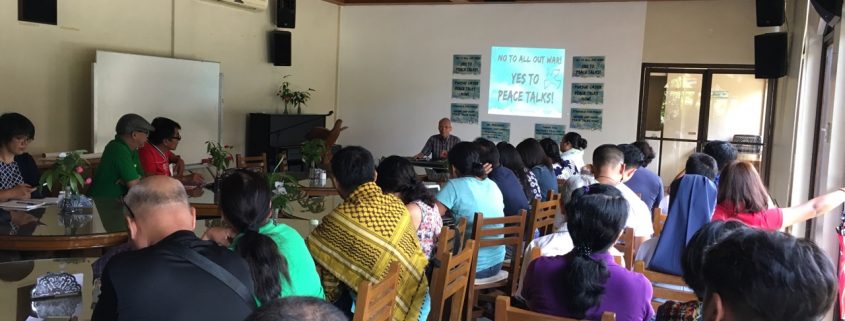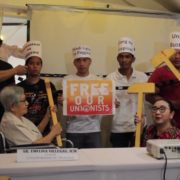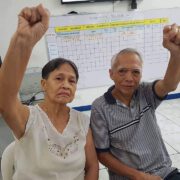Duterte insincere on talks – peace groups
By April Burcer
June 21 should have been the day “Stand Down Agreement” between the government and the National Democratic Front of the Philippines (NDFP) is signed, but the ceasefire did not push through because of the government’s decision to cancel formal talks between the parties.
In the “Are GRP-NDFP Peace Talks Still Possible with Pres. Duterte?” forum Thursday hosted by the group Pilgrims for Peace, Rey Casambre of the Philippine Peace Center said the Rodrigo Duterte government’s cancellation of the signing and implementation of the stand down agreement as well as the resumption of formal negotiations next week shows its insincerity in pursuing peace.
According to Casambre, another backchannel session is supposed to be the held as a final preparatory meeting being the government panel and NDFP finally resume formal negotiations.
Casambre also recalled that Duterte cancelled the fifth round of talks in May 2017 even as “all members of both panels as well third-party facilitators are already in The Netherlands.”
There have been three other attempts to hold the fifth round of formal talks in Europe, but were all cancelled by Duterte.
Last November, Duterte again cancelled at the 11th hours even after his negotiators have assembled in Europe for their third attempt at a fifth round of formal talks with the NDFP.
Duterte subsequently issued his Proclamation 360 on November 23 declaring the unilateral termination of the peace negotiations.
Even then, Duterte’s Proclamation 360 failed to follow the agreed process of talks termination, said Casambre.
“Any party can terminate the peace talks but there is a proper procedure. A written notice should be sent by the party who wants to terminate the peace talks. And there is another 30 days after receipt before the agreement is officially terminated. There was no written notice, it’s [just] a public declaration,” Casambre explained.
Duterte later added the issuance of Proclamation 374 declaring NDFP allied organizations, the Communist Party of the Philippines (CPP) and the New People’s Army (NPA), as terrorist organizations.
Six hundred personalities were later listed by the Department of Justice as people behind the CPP and the NPA, including United Nations rapporteurs.
Bad Signal
It is not only with the NDFP that Duterte is insincere in talking peace, a Bangsamoro group said.
“For example, with the BBL (Bangsamoro Basic Law), even though it has been signed, we can only describe it as mangled, a sham, because the government can change it anytime. So the sincerity is a big question,”Jerome Succor Aba of SANDUGO and Moro Christian People’s Alliance (MCPA) said.
“The postponement of the peace talks brings a bad signal to the people of Mindanao. If there’s no peace talks, the human rights violations will double,” Aba said.
As the center of the armed conflict, Mindanao “calls for the resumption of the peace talks and honoring the agreements because what is happening in the peace talks have impact on the people,” Aba added.
He said, “We noticed that the time when the Proclamations 360 and 374 were issued were also the times when the military attacks in Mindanao were heightened. Since Martial Law was declared, more than 500,000 civilians evacuated from the area of conflict. Every week, farmers, Lumads and Moro are being killed.”
“What the AFP and Duterte government doesn’t realize is that Martial Law, in history, is what prompted the people to fight for freedom,” warned SANDUGO’s Kerlan Fanagel.
Disappointment and hope
Pilgrims for Peace and other peace advocates also expressed disappointment with the repeated postponement of the resumption of the formal talks.
“We want the peace negotiations to continue, to resolve the roots of the armed conflict. The bigger peace table with the Philippine citizenry has been on-going throughout the negotiations. The Filipino people want peace: both the peace that is the absence of armed conflict and, more importantly, peace that can be aided through agreeemnts like the anticipated Comprehensive Agreement on Socio-Economic Reforems (CASER),” the PFP statement said.
Casambre, however, said there is still hope for the peace talks.
“Yes, because there’s a people. Because when there’s a crisis, the people would make the parties go back to the peace negotiations,” Casambre said. #







